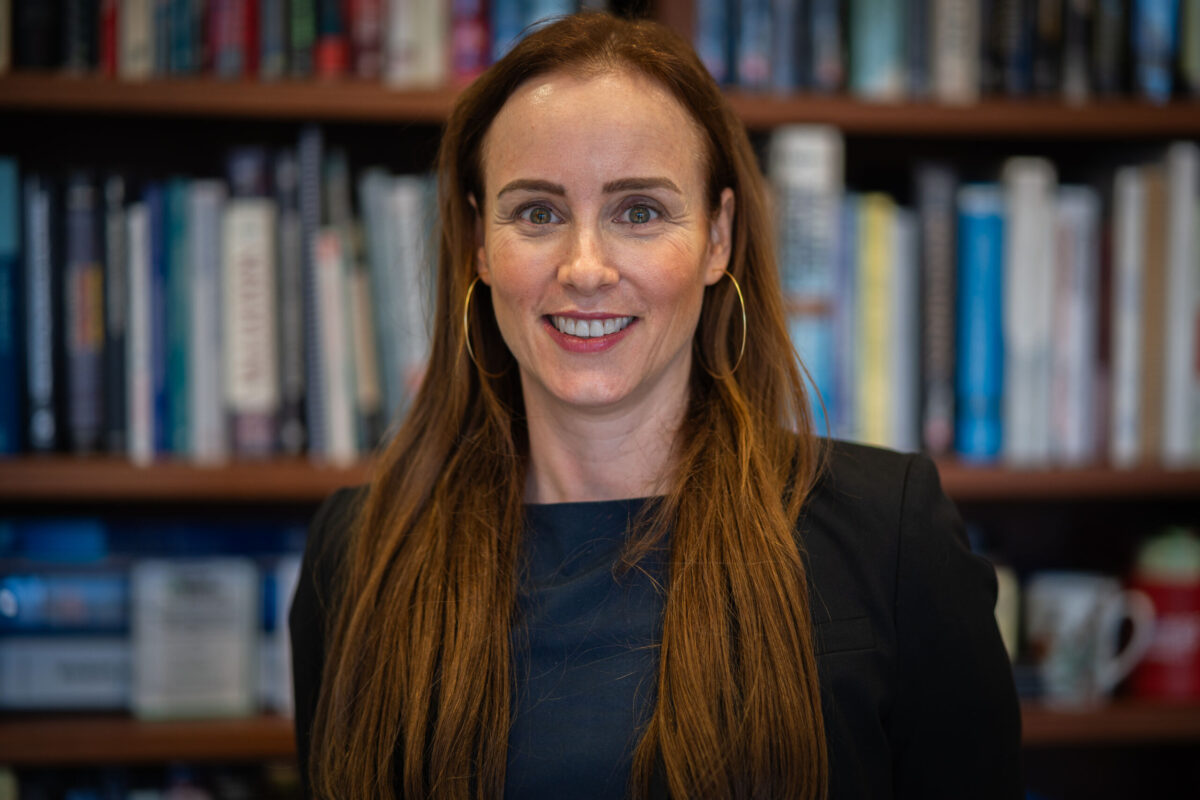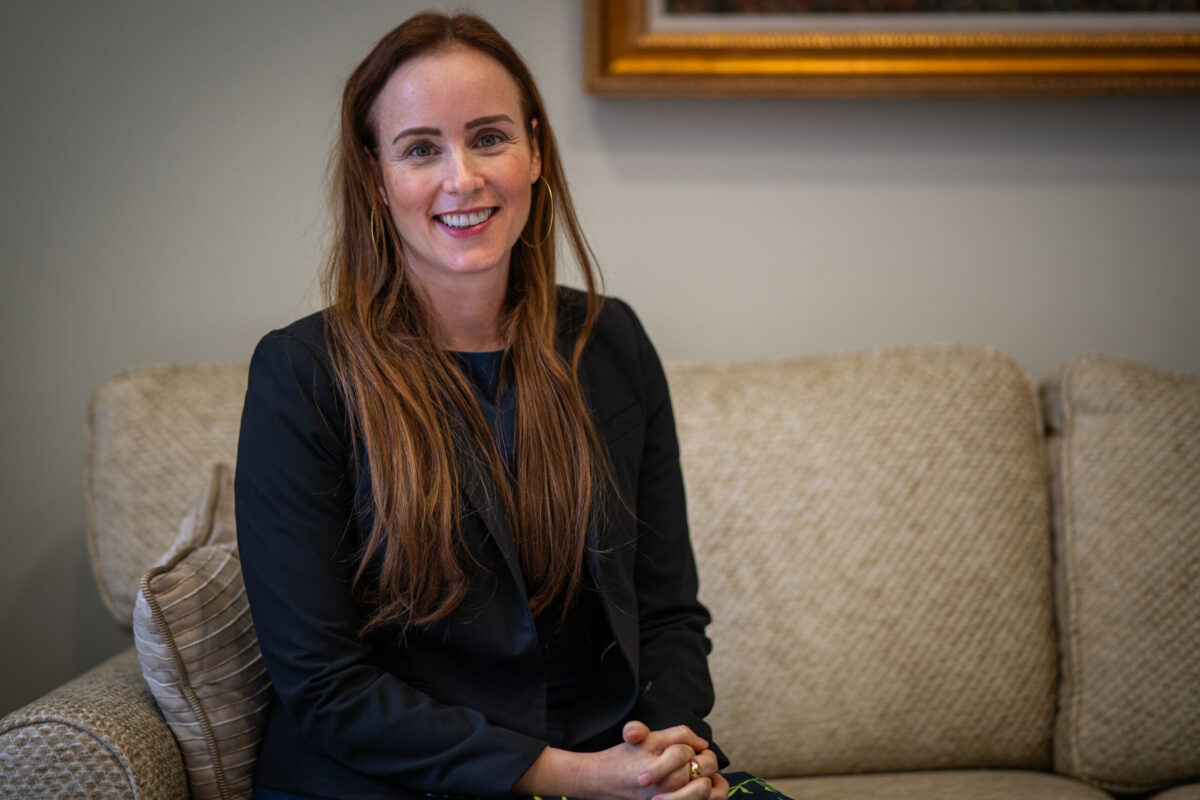The Business of Caring
Posted on March 8, 2024
Paige Ouimet: “Business is such a huge part of our society, so let’s figure out how we can make it more efficient, by all means, but also how to treat people well.” (Photo: Carolina Alumni/Cory Dinkel)
The American economy is confusing. Growth is up, but consumer confidence is down. Inflation is down, but people are still frustrated with high prices. Interest rates are near the highest level in decades, but unemployment is at historic lows. Lots of different metrics point in lots of different directions, making it hard for economists — and average Americans — to get a handle on what’s really happening in the world.
Thankfully, Paige Ouimet sees something elegant in those confounding numbers. As executive director of the Kenan Institute for Private Enterprise, she knows it’s her job to wring insight from the statistical chaos, translating the work of Kenan-Flagler Business School economists into something policymakers and business leaders can use. “It’s just so beautiful to be able to describe something so multifaceted in clearer terms,” she said. “It’s the ability to quantify what seems unquantifiable.”
Ouimet got her start measuring the world as a biologist, looking at new ways of gauging tree health by collecting precise data on the shape and growth of leaves. She loved nature and cared about the environment but soon discovered she liked number crunching more than fieldwork. “I realized that being a biologist was not my cup of tea,” she said. “I really do enjoy sitting at my computer and running data. It definitely makes me happy.”
She changed course and went to business school at the University of Michigan, becoming fascinated at the way corporate decisions affect worker well-being. She has produced widely admired research on pay disparities within firms (bigger firms lead to more inequality), the effect of employee stock ownership on productivity growth (mixed bag, but works best at smaller companies) and the impact of the opioid crisis on labor participation and business investment (firms invest more in automation when there’s a shortage of capable workers).
“My plan all along was to go into finance and really focus on finance and the environment, but it turns out I just really care about people,” Ouimet said. “I like working on people, and thinking about people, and how business and policy decisions can support people.”
Encouraging business leaders to engage broader questions about quality of life — issues such as inequality, health care and drug policy — is a way to both improve the performance of individual firms and advance public interests, Ouimet argues. She has always cautioned her students against viewing companies and capitalism through a black-and-white lens, as either all benevolent or all self-interested.
“Business is such a huge part of our society, so let’s figure out how we can make it more efficient, by all means, but also how to treat people well,” Ouimet said. “At the end of the day, markets are a tool. And a pretty good tool. Not perfect, but something we can learn to use better.”
Today, Ouimet works to improve markets by turning economic data into practical wisdom. The mission of the Kenan Institute is to help the private sector thrive, looking for market-based solutions to society’s challenges. That means listening closely to business leaders, state policymakers and ordinary workers about how the economy is performing for them — and how it can work better.
The Kenan Institute holds regular roundtable discussions with business executives across the state, hearing their concerns and deciding what kind of research might help drive better decisions. Since the pandemic, many of the conversations have focused on the scarcity of workers and the steps businesses can take to recruit more people, train them effectively and keep them onboard longer.
Paige Ouimet works to improve markets by turning economic data into practical wisdom. The mission of the Kenan Institute is to help the private sector thrive, looking for market-based solutions to society’s challenges. That means listening closely to business leaders, state policymakers and ordinary workers about how the economy is performing for them — and how it can work better.
The theme of last year’s Frontiers of Business Conference, a major event on the Kenan Institute calendar that took place in October, was Workforce Disrupted. Ouimet opened the two-day gathering of business executives, academics and state policymakers by describing the challenges businesses face in hiring and keeping skilled people. An aging workforce, fewer immigrants and lack of affordable child care are hindering recruitment and slowing business growth.
Workers are also thinking harder about a sense of purpose in their jobs, Ouimet said, and that’s something companies need to take seriously. “We’re in a very unusual market,” she said. “A lot of employers are still thinking about jobs the way they did 10 years ago. There’s this misunderstanding of what it means to be a worker today, and that’s something we can help address.”
That often means looking beyond raw economic data to collect more on-the-ground insight. A Kenan Institute project called NCGrowth, which provides research and policy advice to economically struggling regions, conducted focus groups across the state with young people who are not employed and not applying for jobs. Managers and policymakers alike want to know why so many people are opting out of work during one of the strongest labor markets in decades.
UNC researchers found traditional incentives such as higher pay or retirement benefits weren’t as compelling as quality-of-life issues — things like flexible scheduling and more autonomy during the workday. Some of the interviewees were more concerned about having the chance to check their phones during the day or take time off for child care than whether a job offered a 401(k) match. Those direct insights can help company leaders hone their recruiting efforts and redesign their training programs.
“I think it’s really critical that our work stays grounded in what businesses need,” Ouimet said. “If you’re running a business, you do not have time to read academic research papers. So what we’re providing is this kind of curation, the big things you need to know, the solutions and best practices. And we are gaining a lot of momentum on this.”

Helping policymakers better understand the perspective of business, and harnessing the power of business leaders to help drive social progress, is at the heart of Ouimet’s vision for the Kenan Institute. (Photo: Carolina Alumni/Cory Dinkel)
A series of articles called “Kenan Insights” provides quick takeaways on everything from ethical leadership to the impact of machine learning on white-collar office jobs. During the past year, the institute has hosted events on artificial intelligence, economic ties to China and housing affordability, among others. “We’re doing all this great research, and if it just lies in academia, it’s painful,” Ouimet said. “I want to get it out there.”
Her research interests focus on inequality and the way business practices can unintentionally widen the social and economic schisms in American society. Her opioid research helped draw attention to the links between economic distress and health challenges. Some of her current work focuses on the way employer health insurance can drive a wedge between workers, encouraging firms to outsource lower-wage jobs to avoid providing expensive benefit packages to lower-income workers.
“Firms that have a lot of benefits end up shedding their low-wage workers because it doesn’t make economic sense to keep them,” Ouimet said. “So you end up with these companies that are just pockets of very similar workers, and that worries me from a polarization standpoint. Workplaces are some of the last spaces where people of different viewpoints and backgrounds spend time together.” Policies that had good intentions — requiring companies to provide the same level of nonwage benefits to all workers, regardless of income — can end up harming the workers they were meant to protect.
Helping policymakers better understand the perspective of business, and harnessing the power of business leaders to help drive social progress, is at the heart of Ouimet’s vision for the Kenan Institute.
“One thing I remind my students is that in countries with stronger capital markets — countries that can fund entrepreneurialism and encourage growth, countries where the institutions work and business can thrive — we see lots of good for society,” Ouimet said. “Longevity, environmental protection, equal rights, protection for the poor, better literacy rates — all of that goes along with prosperity. I think that narrative gets forgotten sometimes.
“I’m not saying the world should be run by economists,” she added. “But we’re good at harnessing people’s incentives to do better.”
— Eric Johnson ’08
Thanks for reading the Carolina Alumni Review
Carolina Alumni members, sign in to continue reading.
Not yet a member? Become one today.
